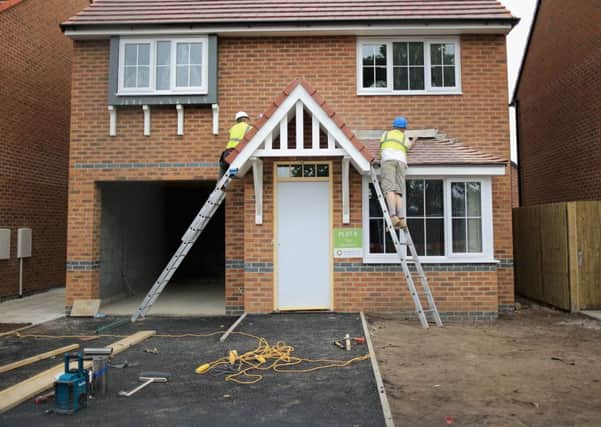Bill Jamieson: Let’s hear it for unsung heroes of Scotland’s construction sector


Prosaic awards you may think, until you see the range of projects submitted, and the skill, excellence and technological expertise displayed on work employing thousands of workers and worth tens of millions of pounds.
This year brought a record number of entries, with 13 awards covering small building renovation, ambitious new build, kitchen and bathroom extensions and a centre for adults with learning disabilities.
Advertisement
Hide AdAdvertisement
Hide AdThe Small Renovation project award was won by Edinburgh-based Thistle Trade Group for a modern glazed extension to a split-level property requiring fine detailing on window installation.
The Medium Renovation project (costing over £50,000 but under £150,000) went to Martin & Sons Builders from Kilwinning for a comprehensive re-design of kitchen, living and dining room extension and garden make-over.
The Large Renovation award was won by MCK Construction from Montrose for a conversion of a derelict coastguard lookout tower into a family home.
Fleming Buildings was highly commended for its restoration and refurbishment of the former Portland Arms Hotel in Galston, East Ayrshire – a project that collected two such commendations.
The heritage award brought a highly commended citation for MCK Construction with the main award won by Falkirk-based Haldane Construction Services for an extension to an 18th century tower in Bo’ness, West Lothian.
Kevin Wilson Joiners and Building Contractors from Bridge of Allan took the commercial project trophy for the restoration and conversion of a run-down tennis pavilion into a modern café. The public sector/local authority award was picked up by D.I.T.T. Construction from Lerwick for a 70-room centre on Shetland for adults with learning disabilities.
Forres-based MacGillivray Construction won the Low Carbon project award for state-of-the-art energy efficiency. The New Home Award, presented by Jamie Hepburn, Minister for Business, Fair Work and Skills, was collected by Spey Building & Joinery from Kingussie. A particularly warm reception for the apprentice award was given to Jemma Sykes from Barratt North Scotland, with Damian Galazka of Bathgate-based Taylor Roofs highly commended.
Arguably most intriguing of all was the Heavenly Builder award to mark “professionalism, courtesy and exceptional customer service”. This was won by David MacGillivray and his Forres team.
Advertisement
Hide AdAdvertisement
Hide AdFinally, the Federation of Small Businesses’s Outstanding contribution Award was collected by Jim Gilmour, prominent FSB figure, government liaison leader and advocate.
As for workload and morale across the Scottish membership, FMB Scotland director Gordon Nelson reports that Scotland’s small building firms had a strong start to 2019, in contrast to the UK construction SME sector more broadly.
Key results from the FMB’s State of Trade Survey for the first quarter were that while SME workloads declined 29 per cent UK-wide – the first fall in six years – in Scotland there was a jump of 10 percentage points compared with the previous quarter.
Skills shortages remain a concern, with bricklayers once again the trade in most short supply, with almost two-thirds (64 per cent) of firms having difficulties hiring them. Said Nelson: “It’s encouraging that the Scottish construction industry is bucking the wider Brexit trend with workloads and enquires in rude health.
“Scotland’s good fortune could be due to fewer EU workers being based north of the border compared with other parts of the country, like in London where one-in-three construction workers are from the EU. Relying less heavily on migrant workers has meant that the Scottish construction industry hasn’t fallen fowl of thousands of EU workers returning home during the long march to Brexit due to no longer feeling welcome in the UK, or sure of their future here.”
The uncertainty over a second Scottish independence referendum, “on top of the continued uncertainty stemming from Brexit”, he warned, “could impact on the construction sector in Scotland. The fear is that a looming second referendum could test consumer confidence this year and next. For construction SMEs, this is particularly concerning as their prospects are vulnerable to dips in consumer confidence as so much of our work comes from the private domestic sector.”
The UK government, he added, “would be wise to reduce VAT from 20 per cent to 5 per cent on all housing repair, maintenance and improvement work.” This, he argued, “could boost the UK economy by more than £15 billion over a five-year period. This reduction in VAT could also create 4,000 new construction jobs in Scotland specifically. Such a VAT reduction has the backing of more than 60 business groups and charities as there is no other policy that would provide an immediate boost to the economy, reaching every corner of the UK.”
Confidence bounce at FSB
Just when morale seems to be hit even further by Brexit, Scottish business confidence has bounced back into the black for the first time in a year, according to new figures from the FSB.
Advertisement
Hide AdAdvertisement
Hide AdIn the second quarter of 2019, FSB’s Scottish Small Business Index (SBI) increased by a record 37.5 points to plus 3.3. This is only the second time since 2015 that business optimism in Scotland has been in positive territory – and comes after two quarters of record-breaking lows.
In contrast, the UK Index has fallen further into negative territory, down to minus 8.8 points from minus five last quarter. Says Andrew McRae, FSB’s Scotland policy chair: “After five years lagging behind the UK average – and some record low readings over the last six months – it’s a refreshing change to see Scotland bucking the trend in a positive way.”
However, that resilience could be sorely tested as political and economic uncertainty mounts in the second half of the year.